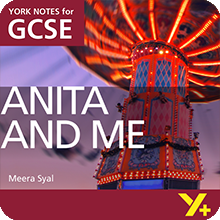Examiner's Notes
You assessed this answer as a Very High.
Hover over the highlighted text to read the examiner’s comments.
- refer to the extract and the novel as a whole
- show your understanding of characters and events in the novel
The passage begins, just after Meena’s tenth birthday, with the Kumars discussing her, employing a technique that Syal sometimes uses – Meena overhearing conversations. This also happens, for example, when Mama gives the Aunties ‘an entire C V of [her] misdemeanours’. Both overheard conversations show that Meena’s parents worry about her behaviour, such as her lying, and do not know what to do about it. Overhearing is a useful technique in a first-person narrative as it gives Meena, and therefore the reader, access to situations she would not otherwise know about, but it also underlines how she feels left out by her parents. Another example is when she recalls her seventh birthday, having to cope with Mama’s mood and then nearly choking on a hot dog in the back of the car while her parents talk in ‘soft whispers’ in the front.
It is significant that Syal uses ironic quotation marks around ‘my party’ in the passage. It is meant to be Meena’s birthday party but, as she explains, it is really just ‘the usual music evening’ with adult friends. This shows Meena’s tendency to feel disappointed by her parents. Just before the extract, her birthday presents are another example of this. She receives ‘sensible clothes’ in colours she dislikes and books that are too young for her.
Meena also finds her parents embarrassing. She wishes, for example, that their front garden could look more like their English neighbours’ gardens instead of being used to grow herbs for Mama’s cooking, pointing to an English–Asian cultural difference. The extract also shows Mama being embarrassing, tugging at the seat of Meena’s jeans – which she does not want her daughter to wear instead of Indian clothes.
The extract, however, shows that Meena’s parents care enough to make the effort to understand her, which is why they wonder if she is jealous of the new baby, Sunil. This could be true, as at one point she suggests they should put him in an orphanage, though later she comes to love him.
The extract also reveals Papa’s awkwardness with Meena now she is growing up and identifying more and more with Anita: he ‘cleared his throat and took in a deep breath’. This suggests he feels that talking to Meena is a challenge. His question suggests that he cares but cannot understand her being uncommunicative: ‘You talked to me. Why have you stopped?’ Meena is equally ‘bewildered’, and does not notice how their relationship has changed, but she also senses that they are ‘held together’ by more than words. Even in the novel’s opening passage, which the extract echoes in being another difficult father–daughter walk, he shows he cares, wants to give her a chance, and is disappointed rather than angry with her. Meena, in turn, shows her sympathy for him by admitting to lying about the sweet money, so that Papa will not be shamed in front of Mr Ormerod. Despite this, she now wants to keep him at a distance. Syal expresses this in Meena’s exaggerated ironic suggestion that Papa might want to ‘swap make-up tips’ with her.
On the whole, Meena feels closer to her father than her mother, especially after the birth of Sunil, though strangely she says in Chapter 2 that she enjoys her mother’s anger, ‘the glimpse of monster beneath the mother’, and that this is when they understand each other best. However, she is closest of all to Nanima, who accepts Meena’s wildness, affectionately calling her a ‘junglee’, a wild girl. Meena also feels protective towards her, for example with the Ballbearings women, and when she thinks Mr Ormerod has cheated her.
Meena has a much better relationship with her family than Anita does, even though she feels a misfit. However, at the point of the extract their relationship is changing as she grows up and gets closer to Anita, as reflected symbolically in the change brought to Tollington by the motorway diggers that father and daughter see.
